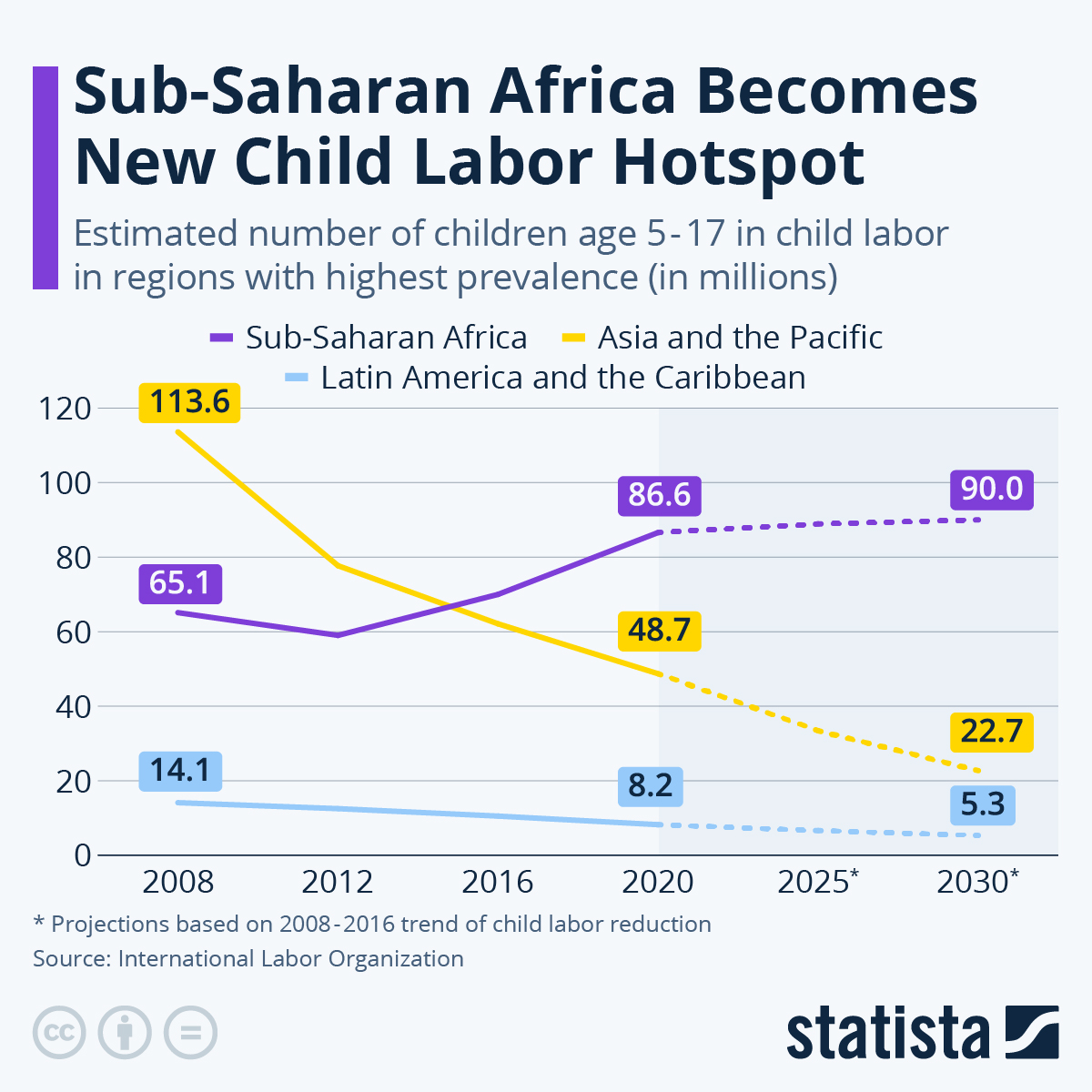
160 million children aged between 5 and 17 worked in child labor in 2020, 79 million of which in hazardous work actively endangering their physical and mental health, according to a report by the International Labour Organization (ILO).
As Statista's Florian Zandt shows in the following chart - based on historical and current estimates as well as trend projections - more than half of child laborers were concentrated in one region.
You will find more infographics at Statista
The latest available data suggests that in 2020, 86.6 million underage workers in in Sub-Saharan Africa were active in "employment below the minimum age as established in national legislation, hazardous unpaid household services, and the worst forms of child labor: all forms of slavery or practices similar to slavery" as defined by the ILO and cited by the U.S. Department of Labor.
Compared to the other main geographical regions with a high prevalence of child labor, Asia and the Pacific and Latin America and the Caribbean, the amount of child laborers increased by 33 percent since 2008. The figure is projected to rise by four percent between 2020 and 2030, even considering positive trends in reducing child labor.
In Asian countries like India, Bangladesh or China, the number of children working in unsafe working environments or being employed illegally according to the minimum age for joining the respective country's workforce has more than halved since 2008, while Latin America and the Caribbean saw a reduction by six million individuals or 42 percent.
ILO figures for forced labor, which stood at 28 million people in 2022, might contradict child labor data on the surface.
However, not every child laborer is technically forced into work; the ILO estimates that about 3.3 million children worldwide are subjected to forced labor, which is defined as "all work or service exacted from any person under the menace of any penalty and for which the said person has not offered himself voluntarily".
70 percent of child laborers worldwide are employed in the agricultural sector.
In the underage forced labor segment, which is a subset of child labor, about half of the children are commercially sexually exploited.
160 million children aged between 5 and 17 worked in child labor in 2020, 79 million of which in hazardous work actively endangering their physical and mental health, according to a report by the International Labour Organization (ILO).
As Statista’s Florian Zandt shows in the following chart – based on historical and current estimates as well as trend projections – more than half of child laborers were concentrated in one region.
You will find more infographics at Statista
The latest available data suggests that in 2020, 86.6 million underage workers in in Sub-Saharan Africa were active in “employment below the minimum age as established in national legislation, hazardous unpaid household services, and the worst forms of child labor: all forms of slavery or practices similar to slavery” as defined by the ILO and cited by the U.S. Department of Labor.
Compared to the other main geographical regions with a high prevalence of child labor, Asia and the Pacific and Latin America and the Caribbean, the amount of child laborers increased by 33 percent since 2008. The figure is projected to rise by four percent between 2020 and 2030, even considering positive trends in reducing child labor.
In Asian countries like India, Bangladesh or China, the number of children working in unsafe working environments or being employed illegally according to the minimum age for joining the respective country’s workforce has more than halved since 2008, while Latin America and the Caribbean saw a reduction by six million individuals or 42 percent.
ILO figures for forced labor, which stood at 28 million people in 2022, might contradict child labor data on the surface.
However, not every child laborer is technically forced into work; the ILO estimates that about 3.3 million children worldwide are subjected to forced labor, which is defined as “all work or service exacted from any person under the menace of any penalty and for which the said person has not offered himself voluntarily”.
70 percent of child laborers worldwide are employed in the agricultural sector.
In the underage forced labor segment, which is a subset of child labor, about half of the children are commercially sexually exploited.
Loading…






